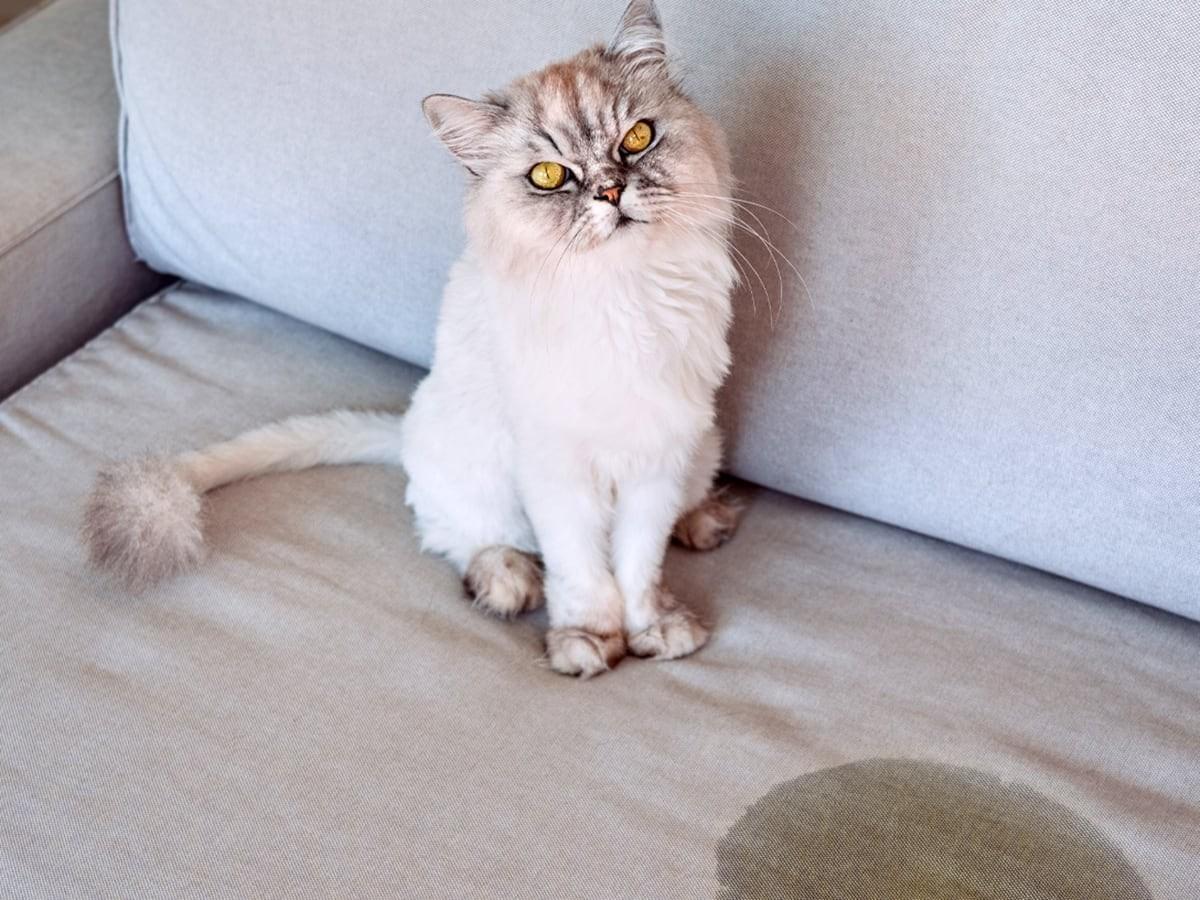Let's be honest – having a cat is awesome, but those occasional smelly "oops" moments are part of the deal. That stubborn cat pee odor can cling like nobody's business. But don't fret, it doesn't have to be a permanent fixture in your home. A few strategic techniques, the right knowledge, and a dose of patience will empower you to conquer stains and smells!
Your Cat Pee Fighting Toolkit
DIY Powerhouse: Baking Soda & Vinegar. Combine equal parts white vinegar with water and toss in some baking soda. Don't underestimate this kitchen staple combo – vinegar's acidity targets those stinky alkaline culprits in urine, while baking soda helps absorb odor.
The Big Guns: Enzyme Cleaners. When smells have really set in, step up your game with enzyme cleaners designed specifically to combat pet messes. These products aren't just masking the smell, they break down the odor-causing elements in urine on a molecular level. Find them at pet stores or online.
Hard Pass on Ammonia: You might instinctively reach for that cleaning powerhouse, but hold on! Ammonia and cat pee smell too similar to your feline friend, which actually encourages them to repeat the offense in the same location. Nope, we want to break the cycle, not reinforce it.
The Cleaning Playbook (Works on Most Stuff!)
Whether that mischievous pee attack was on your rug, your sofa, or even a prized pair of shoes, here's a general plan to neutralize the situation:
The Great Blot-Off: Time is of the essence! Soak up as much liquid as you can with absorbent towels. You might be surprised how much this quick-action step helps minimize the lasting impact.
Rinse & Extract: Rinse affected fabrics or carpets with cool water – this dilutes the pee further. A wet/dry vacuum does wonders at pulling up those deep-set liquids. Always avoid hot water or steam cleaning, as this can bake the stain and smell right in.
Unleash the Enzymes: Spray liberally! Cover the whole smelly area and then some. Give enzyme cleaner 10-15 minutes (more for deep-set problems), then go to work blotting again. Repeat the process if the odor doesn't completely vanish the first round.
Problem-Solving Specific Messes
Carpet Combat: Carpets are champs at trapping smells, so patience is key here. If necessary, repeat the blotting, rinsing, and enzyme treatment a few times to win.
Help, It's Soaked My Wood Floor! This is urgent! Wood absorbs liquid fast. Hit fresh spots immediately with enzyme cleaner. Sadly, old stains might need professional sanding and refinishing – consult a flooring expert, especially for valuable hardwood.
Laundry Woes:
Pre-Treat: Before tossing pee-stained items in the wash, rinse them thoroughly with cool water. This pre-step tackles a massive part of the smell before it sets in.
Wash: Add baking soda OR vinegar to the cycle, along with regular detergent. Baking soda helps absorb residual odor, while vinegar breaks down those sneaky scent molecules. Definitely skip the bleach!
Air Dry: The dryer is your enemy on this one. Air drying avoids potential stains setting from heat. If the smell isn't fully gone after one try, run it through another wash cycle with enzyme cleaner added.
The Great "Why Didn't You Use the Litter Box?" Mystery
A smelly incident is annoying, but repeated incidents are beyond frustrating. To nip those bathroom issues in the bud, consider:
Medical Checkup Time: Cats get UTIs, kidney problems, and more, just like us. These can trigger odd potty habits. If it's been a while since Fluffy had a vet visit, or her behavior suddenly changes, it's a must!
Litter Box Woes: Are you scooping daily? Replacing the litter every 1-2 weeks? Cats are particular. Experiment with unscented litter types (perfumes sometimes turn some cats off), box sizes, or even consider self-cleaning boxes for the ultimate in kitty sanitation.
Feeling Crowded? In multi-cat households, space issues cause drama, cat’s can be territorial. If possible, follow the golden rule: one litter box per cat, PLUS one extra! Give them options in different areas of your home to limit any pee-motivated turf wars.
Prevalence of Cat Pee Problems
Accidental Urination:
While exact figures vary, studies suggest a significant percentage of cats have at least one instance of urinating outside the litter box. Some sources indicate this could be as many as 10% of cats over their lifetime.
Behavioral Issues:
Estimates suggest that inappropriate urination due to behavioral reasons (stress, anxiety, territorial marking) is even more prevalent than accidental urination.
The Science Behind the Stink
Uric Acid:
Cat urine contains around twice the amount of uric acid as dog urine, significantly contributing to its persistence and potency.
Ammonia:
Bacterial decomposition of urine can release an ammonia-like odor that is significantly stronger than the original urine smell, and even more difficult to remove.
Prevention is Your Ultimate Weapon!
Proactive cleaning and figuring out what ticks your cat off about their bathroom situation are key. No one wants repeat episodes of the pee-smell battle. With some knowledge, effort, and maybe a bit of feline psychology, you'll achieve that oh-so-satisfying pee-free, fresh-smelling home everyone yearns for. The cat may never learn to clean those boxes, but hey, with these tips, at least their accidents won't rule your life!
How Spot Pet Insurance Can Help
Spot Pet Insurance partners with you to protect your kitten’s health and your financial well-being. Our plans are flexible, letting you choose the coverage options that make sense for your family and budget. Say goodbye to per-incident and lifetime caps; we're in this together for the long haul. Spot covers accidents and illnesses, and preventative care options put routine vet visits right within reach. Get a free quote today and start protecting your furry friend with Spot!

The resident animal enthusiast at Spot. I have a lifetime of pet parent experience. If it has fur, feathers, or scales, I’ve probably shared my home with it. I aim to be a reliable source, blending experience with a dedication to the well-being of pets.












